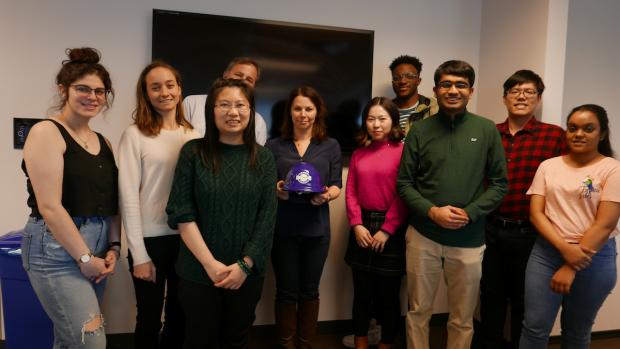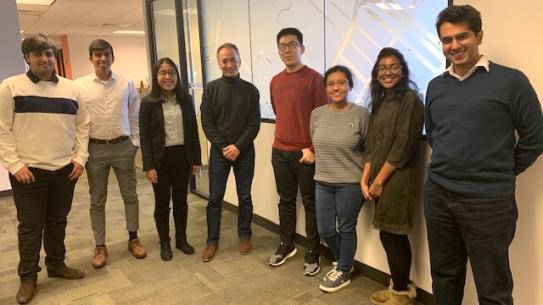NYU Tandon Alumni Provide Valuable Insights to Students

Elaine Tomassetti (center) with students at an Alumni Roundtable luncheon
This year, NYU Tandon continues the tradition of inviting notable alumni back to the school to speak with ambitious and accomplished students (who are selected based on their academic performance, record of service to the Tandon community, and the recommendation of their professors). The group shares a meal, discusses possible career paths, and compares School of Engineering experiences, then and now.
The past few weeks have been a busy one for the initiative, with four distinguished alums making time to come to downtown Brooklyn to take part. In the end, it was a gratifying experience for all: the students were eager and engaged, the conversations warm, and the benefits of the alumni’s wisdom incalculable.
George Antoun
Once you’ve made a momentous and difficult move like leaving your war-torn country to forge an entirely new path, it’s likely that you will learn not to fear the unknown and that few work situations will really faze you.
“Put yourself in uncomfortable situations, because being too comfortable will cause you to stagnate,” Georges Antoun, who came to America from his native Lebanon as a teen, advises.
If you’re not sure what to do, be open to trying anything and everything.”
Upon his arrival in the U.S. back in the early 1980s, Antoun settled in Lafayette, Louisiana, taking some comfort in the company of his younger sister, who had fled Lebanon with him at the behest of their mother, who feared for their future in the midst of that country’s lengthy civil war. He also found some reassurance in his ability to communicate in that polyglot city with other French speakers. Earning a B.S. in Engineering from the University of Louisiana at Lafayette and a master's degree in Information Systems Engineering from what was then known as Poly, he embarked on a career in the Science and Technology Division of Nynex (now Verizon Communications), and he was there at the launch of Caller ID, a service most people thought would never catch on. He later landed at the iconic firm Cisco, and as vice president of such divisions as Worldwide Systems Engineering and Field Marketing, Worldwide Optical Operations, and Carrier Sales, he became known as a “turn-around” guy, adept at troubleshooting ailing enterprises.
After an attempt at “retirement” and a stint as a venture capitalist, Antoun was lured back to industry, this time in the area of solar energy. Now the chief commercial officer of First Solar — a company that develops, finances, engineers, constructs, and operates many of the world’s largest grid-connected PV power plants — he explained to Tandon students that the leap from telecom to solar had been a large one. “Still,” he asserted, “the engineering principles are the same and the technology can be broken down in the same way. You will have to consider things like cost, practicality, quality, and logistics in all cases. When you’re looking at a potential company, it’s more important to consider the people there and whether their vision and mission aligns with your own.”
Antoun spoke to the students about a variety of topics, including the difference between a good leader and a mere administrator (the ability to quietly inspire and a willingness to be a strong advocate); the relative insignificance of awards; and the importance of truly taking ownership of a job at every step of the way rather than simply accepting accountability when things go wrong.
He also passed along wisdom from his mother, who had always advised him to be decisive. “Not making a decision is actually the worst decision,” he said. “Just accept that every decision has the potential to be wrong, but how wrong is going to be based on how well you’ve thought it through. Even someone as accomplished as Steve Jobs was wrong countless times. The important thing is not to get defensive about being wrong; learn, adjust and correct, and then move on.”
As Antoun's life and career show, sometimes moving on means a whole new world of opportunity and accomplishment.

Christopher Hla-Gyaw
Back when he was a recent graduate with a newly minted degree in chemical engineering, Christopher Hla-Gyaw was excited to win what he considered to be a dream job: working at the petrochemical giant Exxon in process operations and design. Even when his duties required him to be at the plant into the early morning hours and in cold weather, he reveled in the fact that he applied everything he learned at school to solving challenging and real-world chemical engineering problems.
After his roles in operations and design, Chris moved to product development. In his new capacity, he worked to market specialty chemicals to customers and often worked to tailor them to meet specific customer or market requirements. While in this role, he found his interests and career pivoting from the engineering aspects of his work to the financial aspects. After earning an MBA in finance and international business from NYU Stern, Hla-Gyaw embarked on an entirely new phase, accepting such posts as internal audit manager and business development manager of the BOC (now Linde) Corporation’s Southeast Asia and Latin American divisions. After a stint in M & A financial analysis with Hertz, he joined Infineum, a global specialty chemical company owned by Shell and ExxonMobil, where he leads the finance groups handling the company’s operations in the Americas.
Being amenable to change could be one key to their future success, he explained to the students. “You’ll miss a lot if you never step outside your comfort zone,” he said. “Try to keep your eyes, ears, minds, and hearts all open.” Engineering skills, he asserted, would be valuable no matter where a student’s interests ultimately took them.
We’re problem-solvers and every field needs problem-solvers: people who can gather and analyze information, form a hypothesis, test it, and reiterate if needed.”
Judah Levine
You might not think right away of art in connection with an engineering school. Yet, Judah Levine, who earned his electrical engineering degree here in 1975 and is a certified Project Management Professional (PMP), played a significant role in managing the Metropolitan Museum of Art's mail order, curatorial, and retail operations. During his career at "The Met,” he was instrumental in implementing client/server computing and new systems to track the museum's collections.
His CV also includes a long stint at Nuance Communications, a well-regarded speech and language recognition software company in Boston, where he worked on speech-enabled telephony-based systems and other related technology and led interdisciplinary teams comprised of speech scientists, user interaction designers, programmers, and QA engineers.
During his recent visit to Tandon, he spoke to students about his wide-ranging career and life experiences — and he gave equally wide-ranging (and exceptionally useful) advice.
Organizational culture matters; you may work for hard-edged bosses, but develop a thick skin and stay focused on the project; treat everyone in the organization, from the top executives to the custodians, kindly; maintain your sense of humor; and, above all, keep learning."
Levine, now retired from Nuance, is exploring the idea of teaching math at the community college level. If his experience at Tandon is any indication, he’ll have no trouble keeping a class’s attention: students appreciated his insights and stayed well past the scheduled end of the lunch to seek personal advice and guidance.
Elaine Tomassetti
Elaine Tomassetti, who earned her degree in civil engineering in 1989, does not believe in sugar-coating things. A woman in the male-dominated construction industry, she knows that behavior that gets a male executive labeled assertive causes her to instead be branded as irritating, aggravating, or worse. “It happens every day,” she told her rapt audience of students. “But I just keep in mind that I have a job to do, and I’m responsible for putting food on the table for many employees. It doesn’t really matter what they call me.”
In some ways, Tomassetti, born into a traditional Italian family, has been disregarding convention for a long time. Her father owned a Brooklyn construction company that provided excavation, foundation, and general contracting work, and while Tomassetti had worked for him since high school, she knew that as a daughter she would never inherit the business. (She was correct in that assumption; her half-brother now runs the operation.) In response, she ultimately launched her own company, J&E Industries, working with her sister, Janice, who provided the accounting expertise.
J&E specializes in installing steel rebar, and she has worked on numerous major projects throughout the city, including portions of the Long Island Expressway and FDR Drive, the new World Trade Center, the Federal Courthouse in Brooklyn, the aquarium in Coney Island, the new Goldman Sachs headquarters, 7 Bryant Park, and Hudson Yards. (While working on the Hudson Yards project, one of her workers was killed when a crane owned by another company fell; the incident still haunts Tomassetti, who is known for caring deeply about her workers and treating them well.)
Owning a business can be exhausting, she warned the students, and issues like making payroll and having ample insurance, can keep you up at night. Still, she says, she would do it all over again. You’ll be fine, she told them, if you follow a few simple guidelines: “Don’t do anything stupid and remember that the buck stops with you.”
She is heartened by the fact that things are gradually improving for women in many spheres — including for the female students at Tandon. “Back when I was here, there were only about three women’s bathrooms in the entire school,” she quipped, “You had to run all over the place to get to one.”




